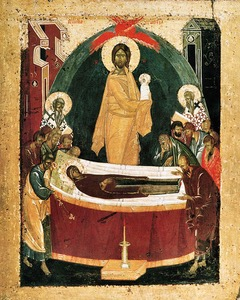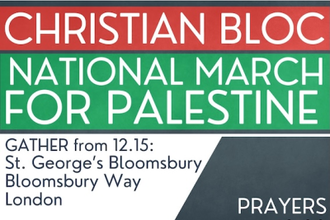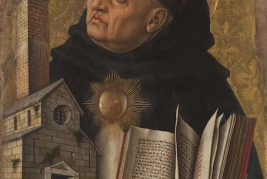Sunday Reflection with Canon Robin Gibbons: 14th August 2022

Image: Wiki Commons
The Assumption of Our Blessed Lady Saint Mary
Whilst the Latin Church (and others who owe their origins to either reform from her or links to her) calls this feast the 'Assumption' of Our Lady into heaven, the Catholic and Orthodox East use that other title, the 'Dormition', the falling asleep in death and her entry as one of the blessed into heaven. In one sense this feast relies on a deep oral tradition, it does not appear in Scripture, nor was it celebrated until after the 5th century but the honour and love the Christian community had ( and has) of the Theotokos, meant that her own death, of which nothing factual is written down, was somehow linked, as it should be, to that gift of resurrected life in and through Christ Jesus, her son. This is what Paul means in the second reading when he writes:
'But now Christ has been raised from the dead, the first fruits of those who have fallen asleep. For since death came through a human being, the resurrection of the dead came also through a human being. For just as in Adam all die, so too in Christ shall all be brought to life.'(I Cor 15: 20-22)
None of us, certainly not Mary, are excused death. As our faith is built on Christ, so too we need to ground our feasts and understandings of liturgical celebrations like this one, in terms of Christ. In this case we can discern a two fold meaning which we can build up through reflection on those two distinct terms, 'Dormition' and 'Assumption' . It is through Mary that the Word made flesh was incarnate in human life, her gift, her nurture, love and support of Jesus in his growth, maturity and ministry is part of the Gospel story, though mostly hidden from our view. So in that sense the celebration of her Dormition, her own death, is a testament to that death in Adam we all have and share. This is why in the Icons of the feast, Mary is shown in bodily death, the gathered apostles weeping at her bier, but above her lifeless body, in an aureole of light, is Christ taking her soul with him into heaven!
In this sense the term Dormition holds for me that express teaching that Christ died, descended to death and was raised, none of ius can by pass this for the mystery of death is that it is our ending but also our beginning in Him, the Risen Glorified One who conquered death. Mary's falling asleep places her with us, united as our sister in human flesh, but it also gives us hope in eternal life that we too will be raised with Christ as she is. What then of the term Assumption, that definition of her being taken up into heaven body and soul? Straight away I must remind myself that this is the realm of symbol, of the language of poetry, where the reality is clothed in images that try to help us understand the mystery but must not be made by us into factual signs or some form of unnecessary magic. We have to be humble here and acknowledge as others do that Mary had to share in death before she could share in the resurrection.
The Assumption then is perhaps that second part of our death, the movement from our earthly ending, through a doorway opened by Christ, into hope of a life that God's love calls us towards, a life of light and also our resurrection, which brings us into the glory of the Kingdom. It is the Lord's welcome into the wedding feast of the Bridegroom where we shall see Him, but also Mary united with all of us there. I find no difficulty in using both terms to describe this feast as a diptych of salvation, the triumph of the resurrection seen through the image of Mary's earthly death and entry into glory. We ask her intercession: Holy Mary Mother of God, pray for us sinners now, and at the hour of our death. Amen
Lectio
John Damascene 8th C - from a homily on the Dormition
"Good Mistress, graciously look down on us; direct and guide our destinies wheresoever you will. Pacify the storm of our wicked passions, guide us into the quiet port of the divine will and grant us the blessedness to come."
Saint John Paul II - General Audience 25th June 1997
It is true that in Revelation death is presented as a punishment for sin. However, the fact that the Church proclaims Mary free from original sin by a unique divine privilege does not lead to the conclusion that she also received physical immortality. The Mother is not superior to the Son who underwent death, giving it a new meaning and changing it into a means of salvation. Involved in Christ's redemptive work and associated in his saving sacrifice, Mary was able to share in his suffering and death for the sake of humanity's Redemption. What Severus of Antioch says about Christ also applies to her: "Without a preliminary death, how could the Resurrection have taken place?" (Antijulianistica, Beirut 1931, 194f.). To share in Christ's Resurrection, Mary had first to share in his death. The New Testament provides no information on the circumstances of Mary's death. This silence leads one to suppose that it happened naturally, with no detail particularly worthy of mention.
If this were not the case, how could the information about it have remained hidden from her contemporaries and not have been passed down to us in some way? As to the cause of Mary's death, the opinions that wish to exclude her from death by natural causes seem groundless. It is more important to look for the Blessed Virgin's spiritual attitude at the moment of her departure from this world.
In this regard, St Francis de Sales maintains that Mary's death was due to a transport of love. He speaks of a dying "in love, from love and through love", going so far as to say that the Mother of God died of love for her Son Jesus (Treatise on the Love of God, bk. 7, ch. XIII-XIV). Whatever from the physical point of view was the organic, biological cause of the end of her bodily life, it can be said that for Mary the passage from this life to the next was the full development of grace in glory, so that no death can ever be so fittingly described as a "dormition" as hers.
St Marie Eugenie: The Assumption, a mystery of adoration
You are daughters of the Assumption. This mystery which is more of heaven than of earth is a mystery of adoration. In Mary all was adoration; never was a right of God ignored or offended in her. If there has ever been an adorer in spirit and in truth, it is truly the Blessed Virgin. And when, departing from this world, she received the glory which crowned her grace, she was taken up into heaven to remain there eternally all adoration and love.


















